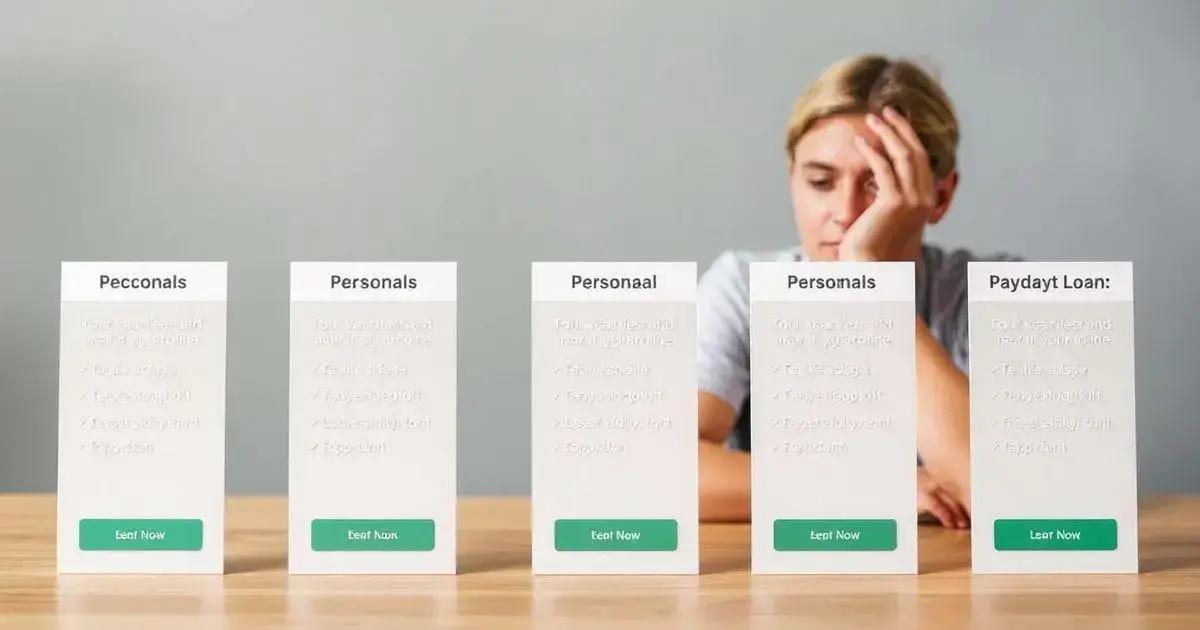If you’re searching for low credit score loan options, understanding how your credit score affects your ability to borrow is key. A low score can limit your choices, but there are still loans designed to help people in your situation.
Factors like payment history, credit utilization, and the length of your credit history all impact your score. With a low score, you may face higher interest rates and fewer loan options, but don’t let that discourage you.
There are loans specifically for those with low credit scores. Keep reading to find out which options are available and how to improve your chances of approval.
Understanding Low Credit Scores
Understanding low credit scores is crucial for anyone interested in low credit score loan options. Credit scores range from 300 to 850, with lower scores indicating higher risk for lenders. A score below 580 is generally considered low and may limit your options when seeking loans or credit.
What Causes Low Credit Scores?
Several factors can contribute to a low credit score, including:
- Payment History: Missing payments or defaulting on loans is a significant red flag for lenders.
- Credit Utilization: Using a high percentage of your available credit can negatively impact your score.
- Length of Credit History: A shorter credit history can make it difficult to establish a good credit score.
- Types of Credit: Having a mix of credit types, like revolving credit and installment loans, is generally viewed favorably.
- New Credit Inquiries: Frequent applications for new credit can lower your score in the short term.
How Low Credit Scores Impact Loan Options
When you have a low credit score, lenders perceive you as a higher risk. This means you may face:
- Higher interest rates
- Increased fees
- Limited loan amounts
- Restricted access to prime loan products
Many lenders offer specialized loans designed for individuals with low credit scores. These may include secured loans, payday loans, or subprime loans. However, it’s important to read the terms carefully, as these loans often come with unfavorable conditions.
Next Steps If You Have a Low Credit Score
Taking steps to improve your credit score can open up better loan options in the future. Start by regularly checking your credit report for errors and making timely payments on existing debts. Building credit slowly but consistently can lead to a stronger financial standing.
Types of Loans for Low Credit Scores

When you have a low credit score, your loan options can seem limited. However, there are several types of loans for low credit scores that can help you meet your financial needs. Exploring low credit score loan options can provide some flexibility when you need it most.
1. Secured Loans
Secured loans require collateral, such as a car or savings account. This means if you fail to repay the loan, the lender can take your collateral. Secured loans typically have lower interest rates, making them an attractive option for borrowers with low credit scores.
2. Personal Loans
Personal loans for low credit scores often come from online lenders and credit unions. While the interest rates may be higher than traditional loans, they can be easier to qualify for. Borrowers can use these loans for various purposes, including debt consolidation or emergency expenses.
3. Installment Loans
Installment loans are paid back in fixed monthly payments over a set period. They can come from both traditional banks and online lenders. Borrowers with lower credit scores can find installment loans that offer more accessible terms, although rates may vary.
4. Payday Loans
Payday loans are short-term loans meant to cover urgent expenses. While they are often easy to obtain, they tend to carry exorbitant interest rates and can lead to a debt cycle if not paid back quickly. They should be used cautiously and as a last resort.
5. Peer-to-Peer Lending
Peer-to-peer (P2P) lending platforms connect borrowers with individual investors willing to fund loans. This option can be beneficial for those with low credit scores, as investors may be more flexible than traditional banks. However, it’s essential to compare interest rates and terms before proceeding.
Overall, exploring different types of loans for low credit scores can help individuals find a solution that fits their financial situation. Always fully research and understand the terms of each loan before making a decision.
How to Apply for a Low Credit Loan
Applying for a low credit loan involves several steps that can help increase your chances of approval. Follow this guide to understand how to navigate the application process successfully and explore low credit score loan options that suit your needs.
1. Check Your Credit Report
Before applying for a loan, review your credit report for errors or outdated information. You can dispute inaccuracies by contacting the credit bureaus directly. Knowing your credit profile helps you understand what lenders may see.
2. Determine Your Loan Needs
Decide how much money you need and the purpose of the loan. Having a clear understanding of your needs will help you choose the right type of loan and lender.
3. Research Lenders
Not all lenders are the same. Some specialize in loans for those with low credit scores. Compare interest rates, fees, and terms across various options, including online lenders and credit unions. Look for lenders that allow prequalification, which gives you an idea of your loan terms without affecting your credit score.
4. Gather Required Documents
Most lenders require specific documents to process your application. These may include:
- Proof of identity (like a driver’s license or passport)
- Proof of income (like pay stubs or tax returns)
- Bank statements
Having this documentation ready can streamline your application process.
5. Submit Your Application
Once you have everything ready, fill out the loan application form. Ensure all information is accurate and complete to avoid delays. Submit your application through the lender’s website or in person, as appropriate.
6. Follow Up
After submitting your application, it’s a good idea to follow up with the lender. This can help you address any questions they might have and keep the process moving smoothly.
7. Review Loan Offers
If approved, you will receive loan offers. Take your time to review the terms carefully. Compare the interest rates, monthly payments, and any fees. Choose the loan that best fits your financial situation.
Applying for a loan with a low credit score can be challenging, but understanding these steps and considering low credit score loan options can help you navigate the process more effectively.
Tips for Improving Your Credit Score

Improving your credit score is essential for securing better loan options. Here are some practical tips to help you boost your score over time and increase your chances of qualifying for low credit score loan options.
1. Pay Your Bills on Time
Your payment history is a significant factor in your credit score. Always aim to pay your bills on or before the due date. Setting up automatic payments or reminders can help you avoid late fees and missed payments.
2. Reduce Your Credit Utilization
Credit utilization is the amount of credit you use compared to your total available credit. Keep this ratio below 30%. Pay down existing balances and avoid maxing out your credit cards.
3. Avoid Opening New Accounts Too Quickly
Each time you apply for a new credit account, a hard inquiry is made on your report, which can lower your score. Limit applications for new credit and only apply for what you truly need.
4. Keep Old Credit Accounts Open
The length of your credit history matters. Even if you’re not using an old account, keeping it open can help improve your score by increasing your average account age and total available credit.
5. Regularly Check Your Credit Report
Request a free copy of your credit report from each major credit bureau once a year. Review it for errors or inaccuracies that could impact your score. Dispute any errors you find to have them corrected.
6. Use a Mix of Credit Types
Having a diverse mix of credit types, such as credit cards, installment loans, and retail accounts, can be beneficial. However, don’t take on debt you can’t manage just to improve your mix.
7. Consider Becoming an Authorized User
If you have a trusted friend or family member with a good credit score, consider asking if you can become an authorized user on their credit card. This can help improve your score as their positive payment history will reflect on your credit report.
Utilizing these tips can gradually enhance your credit score and make it easier for you to secure low credit score loan options in the future.
Common Misconceptions About Low Credit Loans
Many people hold misconceptions about low credit loans. Understanding the truth can help you make informed borrowing decisions.
1. You Can’t Get a Loan with Bad Credit
One common belief is that having a low credit score means you cannot get any loan. While it may be true that options are limited, many lenders specialize in loans for individuals with low credit scores.
2. All Low Credit Loans Have High Interest Rates
Another misconception is that all loans for low credit scores come with exorbitant interest rates. While many do have higher rates, it’s essential to shop around. Some lenders offer competitive rates even to those with poor credit.
3. Applying for a Loan Will Always Hurt Your Credit Score
Many think that applying for any loan will harm their credit score. While a hard inquiry can temporarily lower your score, prequalifying with lenders does not affect your score and allows you to assess your options.
4. Low Credit Loans Are Only for Emergencies
Some believe that loans for low credit scores are only intended for emergencies. In reality, these loans can be used for various purposes, including financing a car, home repairs, or consolidating debt.
5. You Will Have to Pay Hidden Fees
There is a misconception that all low credit loans come with hidden fees. While some lenders do charge origination fees, many transparent lenders openly disclose all fees before you sign a loan agreement. Always read the fine print and ask questions.
6. Improving Your Credit is Not Possible
Some individuals think that once their credit score is low, it will stay that way forever. In reality, credit scores can be improved with the right strategies, like timely payments and responsible credit usage, making it possible to qualify for better loans in the future.
Understanding these misconceptions can empower you to make smarter choices when exploring low credit score loan options.
In Conclusion: Navigating Low Credit Score Loan Options
Understanding and navigating low credit score loan options is crucial for anyone facing financial challenges. By getting familiar with low credit scores, the types of loans available, and how to apply for them, you’ll be better equipped to make informed choices.
Improving your credit score takes effort, but it can significantly expand your loan options and lead to better terms. Don’t fall prey to common misconceptions; educating yourself can empower you to achieve your financial goals.
In this financial journey, remember to ask questions, compare offers, and take steps to enhance your credit standing for a brighter financial future.
